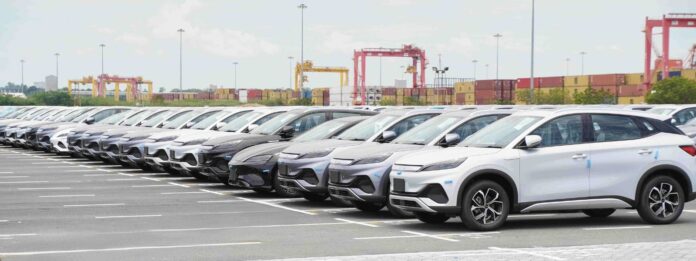By: Staff Writer
November 17, Colombo (LNW): Sri Lanka’s vehicle market long distorted by import bans, erratic tax policies and unstable macroeconomic conditions has entered another turbulent phase, with official data showing a sharp slowdown in car and SUV registrations in October despite an unusual nine-month buying frenzy driven by pent-up demand and policy uncertainty.
According to a fresh analysis of vehicle registry data by Colombo-based brokerage J B Securities, total registrations—including motorbikes fell to 47,685 units in October 2025, down from 48,708 in September, signalling the first broad cooling after months of abnormal activity across segments.
Car and SUV momentum breaks after September’s spike
Motor cars, which hit a post-crisis high of 3,934 units in September, slipped to 3,612 units in October. SUV and crossover registrations saw a sharper contraction from 5,813 units in September to 5,075 in October.
This follows an extraordinary September spike where combined car and SUV numbers surged to 9,756 units, compared to 6,137 units just a month earlier. Industry analysts attribute the surge to aggressive front-loading by dealers anticipating tighter customs scrutiny, possible tax revisions, and delays in valuation processes.
Before the 2020–2022 economic crisis—triggered by a mix of inflationary open-market operations, excessive rate cuts and import controls—Sri Lanka routinely recorded 5,000–7,000 monthly registrations for cars and SUVs. October’s dip suggests the September peak was a temporary distortion rather than a sustained recovery.
BYD plunge highlights regulatory uncertainty
One of the most dramatic shifts was seen in electric vehicle (EV) registrations. Chinese EV giant BYD, which recorded 1,531 units in September, collapsed to 531 units in October after Sri Lanka Customs detained several shipments over a dispute on motor classifications. Analysts warn that such disruptions undermine investor confidence at a time when Sri Lanka is promoting EV adoption.
Meanwhile, emerging Chinese brand BAW gained traction, with its entry-level E-7 model registering 263 units, becoming one of the best performers in its category.
Commercial vehicles show mixed but rising trend
Commercial vehicle registrations presented a more complex picture. Vans climbed from 551 to 716 units, mini-trucks ballooned from 14 to 200, and medium trucks increased from 148 to 209. Heavy trucks also rose slightly to 227 units. Bus registrations declined to 107, though still higher than the August total of 66.
Agricultural vehicles recorded strong growth. Large tractor registrations surged to 1,031, up from 701, led by TAFE. Hand tractors rose from 85 to 128, with Vietnamese brand Vikyno topping the category with 52 units.
Three-wheelers and motorbikes stabilise near pre-crisis norms
Three-wheeler registrations fell to 2,541 units, down from 3,015, yet remained above August levels. Before the economic crisis, Sri Lanka routinely recorded around 10,000 units per month, showing that demand remains depressed. Motorbike registrations Sri Lanka’s most stable category stood at 32,768 units, near pre-crisis levels.
A distorted market with real economic consequences
Economists warn that the erratic swings in vehicle imports highlight deeper structural weaknesses, policy inconsistency, heavy reliance on import taxes, and ongoing foreign exchange pressures. Without a coherent long-term import and taxation strategy, they caution, the vehicle market will continue to swing abruptly between scarcity and unsustainable surges, with significant macroeconom
